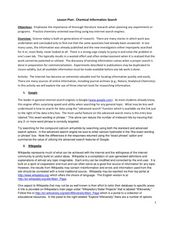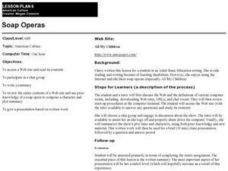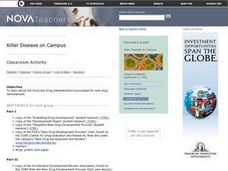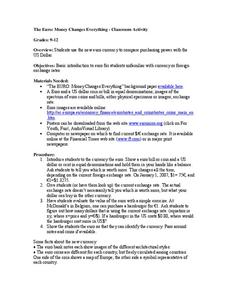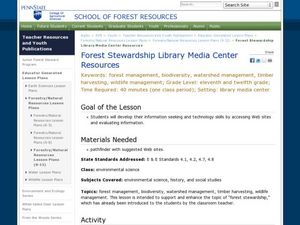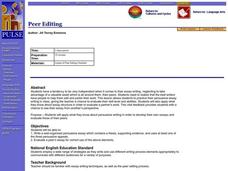Curated OER
Real or hoax?
Seventh graders brainstorm a list of criteria that makes a webpage useful for research and not useful for research. They complete the activity, "Real or Hoax," and discuss fiction and non fiction stories and determine which websites are...
Curated OER
Determining Point of View
Students examine web sites to determine point of view and bias in information sources. They determine the usefulness of information based on these biases or limitations.
Curated OER
Chemical Information Search
Students research information using various internet resources. In this chemistry lesson, students demonstrate their ability to navigate websites and gather necessary information. They evaluate the potential usefulness of the databases...
Curated OER
Evaluating the Products of Chords of a Circle
Students investigate chords and make predictions. In this geometry instructional activity, students graph circles and calculate the measurement of each chord. They perform the calculations and make conjectures.
Curated OER
Creating a Web Page
Young scholars complete a unit focusing on the creation of a student-generated website. They read and evaluate articles about business ethics, critique websites, and develop a student-created webpage.
Curated OER
Tracking down Good Information on the Web
Fifth graders brainstorm on whiteboard Web authorship and what they think they need to know about information on a website in order to judge its content. They research the solar system websites and present them to the class with their...
Curated OER
Spot the Hoax
Students examine websites and use critical thinking skills to determine which one is real and which one is a hoax. They then discuss their criteria for deciding which website was real and which one was not.
Curated OER
PRODUCTION, CONSUMPTION, AND INCENTIVES
Fifth graders design a web page. They include features he or she would typically like to see when visiting web pages. They title the topic of the web page "Features That Make a Great Web Site." They explain that there are incentives...
Curated OER
Making Conventions Unconventional
Students discover how Internet altered the public's involvement in the 2000 Democratic and Republican conventions, and synthesize their evaluations of convention sites to design their own pages for a convention-related Web site.
Curated OER
Soap Operas
Students examine American culture through research on various soap opera websites. They access a soap opera website, participate in a chat group, evaluate the contents of the website, and write a summary of a character and plot.
Curated OER
Web Writer's Block
Students evaluate Web sites banned in various countries, and investigate the reasons why particular countries would want to block information from its people.
Curated OER
Giving Game--Planning to Make The World
Middle schoolers, in groups, examine plans to make the world a beter place. They evaluate the plans based on feasibility, practicality, and do-ability by students their own age.
Curated OER
Killer Disease on Campus
Students identify and evaluate the current FDA procedures for drug development, testing and approval. They conduct Internet research, work in groups to create charts and participate in a class discussion about the pros and cons of...
Curated OER
Language Arts: Using Research Tools Successfully
High schoolers are able to record their research observations and reflections by keeping a research journal. They are able to explore a specific region of the world affected by arsenic contamination by using various research skills and...
Curated OER
Quilt Codes
Young scholars list criteria to evaluate credible historical sources and defend their criteria in an essay. In this historical sources lesson plan, students review information of historical sources as well as the facts and pictures.
Curated OER
Going, Going, Gone
Students investigate how online auctions work and rate the assurances offered by specific auction sites and sellers. They, in groups, evaluate various auction sites, focusing on the site's and seller's predicted reliability; create...
Curated OER
Technical Writing / Siddhartha
Twelfth graders are introduced to and produce several types of technical writing. They watch a crime video and write a police report, explore websites and draft summary sentences, write a personal vision quest based on "Siddhartha" and...
Curated OER
Fast Food Fun
Students use technology to input, retrieve, organize, manipulate, evaluate, and communicate information to find calories and fat in a typical fast food meal. They decide which fast food restaurant you would like to visit and click on...
Curated OER
The Euro: Money Changes Everything
Ninth graders compare the Euro with the purchasing power of the US dollar. In this economic lesson plan, 9th graders evaluate the value of the Euro through various exercises. Students research the currency exchange rates of the Euro.
Curated OER
Forest Stewardship Library Media Center Resources
Students develop their technology skills by accessing web sites and evaluating information. In this research instructional activity students research forestry topics and write a paragraph on the accessed websites.
Curated OER
Industrial Revolution History
Students examine the facets of the Industrial Revolution. In this world history lesson, students use the Internet to research causes, effects, and implications of the Industrial Revolution. Students use selected websites to respond to...
Curated OER
On This Day in History
Students research the Internet to learn historical events that share their birthday. In this birthday research instructional activity, students use the given websites to research important events that share their birthday date. Students...
Curated OER
Obesity, Eating Habits and Weight Loss
Students conduct Internet research, view film and participate in class discussion to identify the problem and causes of obesity in America. They evaluate the food pyramid and break down the nutritional components of fast food and frozen...
Curated OER
Peer Editing
High schoolers write a well-organized persuasive essay which contains a thesis, supporting evidence, and uses at least one of the three persuasive appeals. They evaluate a peer's essay for correct use of the above elements.




